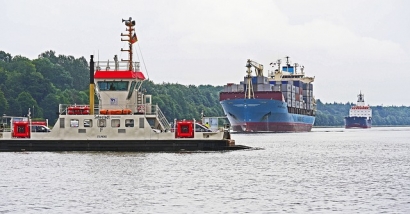
“From our goal of a cleaner Baltic Sea, it is possible to reach the ship, the port and the land of the Baltic Sea at once. All wastewater discharged ashore reduces the nutrient load on the sea. We need extensive cooperation to succeed, ”says Elisa Mikkolainen, BSAG's project manager .
Kymen Vesi treats toilet wastewater discharged by cargo ships into the port of HaminaKotka. The wastewater sludge generated in the process is processed into renewable energy - biogas at Gasum 's biogas plant. In addition, Kymen Vesi takes samples of wastewater from ships, and through this research data is obtained e.g. nutrient concentrations.
Finnish shipping companies are participating in the circular economy co-operation project, e.g. Meriaura and RABN, from foreign e.g. Essberger & Stolt Tankers, Utkilen and Maersk. Among the ship brokers are e.g. C&C Port Agency, Dahlberg's Agency and GAC Finland. Autoyhtymä Vuorinen is responsible for wastewater transportation in the circular economy.
“The Port of HaminaKotka is the largest general port in Finland, with an average of 2,500 cargo vessels calling annually. We want to encourage ships to leave wastewater ashore. We receive and treat toilet wastewater in accordance with the circular economy, ”says Suvi-Tuuli Lappalainen, Development Manager of HaminaKotka Satama Oy .
Sewage and food waste contain e.g. nutrients, bacteria, fats, chemicals and microplastics. When they end up in the sea, sewage and food waste exacerbate the worst problems in the Baltic Sea: eutrophication and oxygen depletion .
There are about 2,000 ships in the Baltic Sea at any one time, 95% of which are cargo ships. An estimated 25,000 seafarers sail on these ships. Domestic and toilet effluents and chopped food waste generated by cargo ships may be legally discharged into the Baltic Sea.
“At Meriaura, we think that responsibility starts where the legislation ends. We want to be pioneers in preventing all ship discharges, and we expect other shipping companies to take voluntary and responsible measures to ensure that wastewater is recovered instead of in the Baltic Sea, ”says Mia Hytti, Meriaura's environmental expert .
Passenger ships, such as car ferries operating between Finland, Sweden and Estonia, have voluntarily left sewage in ports for years. The International Maritime Organisation's (IMO) ban on untreated toilet waste from passenger ships came into force in 2021. A similar ban on cargo ships does not yet exist.
All discharges into the sea are useless. Therefore, ship-generated waste should be recovered from ships in ports and further recovered. The voluntary actions that are now starting to show direction for responsible actors, both on land and at sea.

